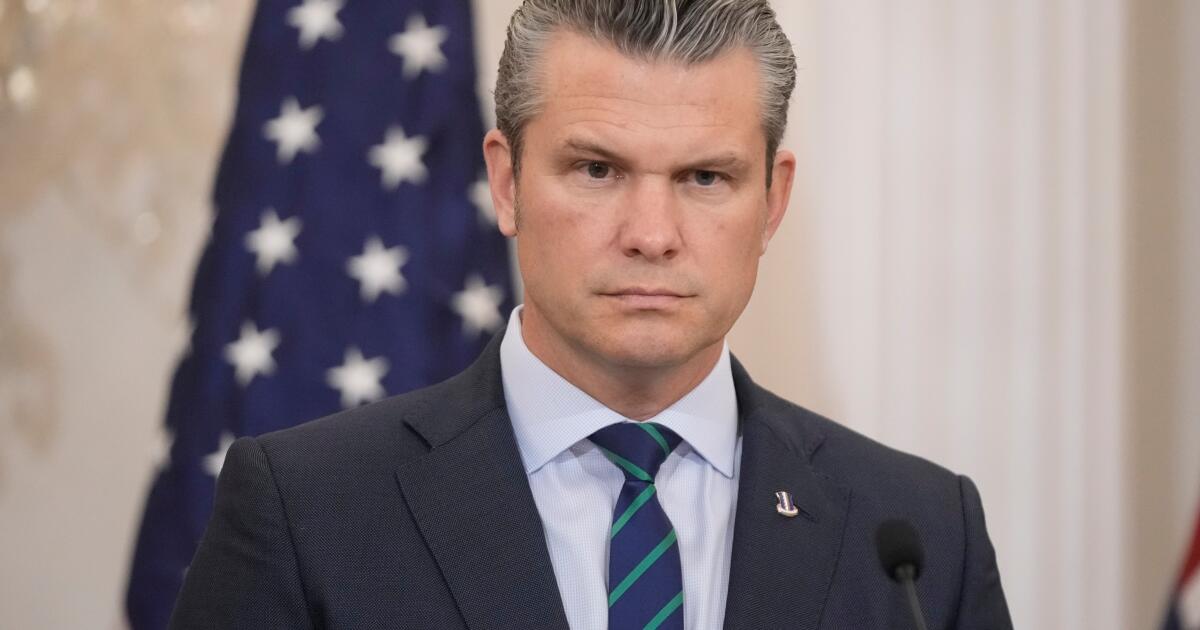Admiral hands over leadership of command overseeing the Trump administration’s boat strikes
DORAL, Fla. — A U.S. Navy admiral who oversees military operations in Latin America handed off command responsibilities Friday as scrutiny increases over the Trump administration’s deadly strikes on alleged drug boats in the region.
Adm. Alvin Holsey has retired one year into a posting that typically lasts three to four years and transferred leadership duties to his top military deputy, Air Force Lt. Gen. Evan Pettus, during a ceremony at U.S. Southern Command headquarters near Miami.
In farewell remarks, Holsey did not mention the military operations or the reasons for his early retirement. But he urged his successor to uphold longstanding partnerships in the region by standing firmly behind the shared values of democracy and support for the rule of law.
“To be a trusted partner, we must be credible, present and engaged,” Holsey said.
Holsey’s shock retirement was announced by the Pentagon in October, over a month into the Trump administration’s strikes on suspected drug boats in the Caribbean Sea and the eastern Pacific Ocean that have killed at least 87 people. With the campaign facing growing scrutiny by Congress, Holsey briefed key lawmakers earlier this week.
Long-term replacement for Holsey hasn’t yet been named
The ceremony Friday was more subdued than past retirements, held outdoors amid a small crowd of mostly Southern Command staff and without Defense Secretary Pete Hegseth, because President Trump has yet to nominate Holsey’s replacement.
Gen. Dan Caine, chairman of the Joint Chiefs of Staff, made no mention of the military operations in Latin America as he thanked Holsey for his 37 years of service. Caine referred to Holsey as a “stoic” leader and “quiet professional” who always leads with his heart and head.
“It’s never been about you, it’s been about people, it’s been about others,” Caine said. “You’ve never said ‘I’ in all the conversations we’ve had. You’ve always said ‘we.’ … The impact you’ve had will last for a long time.”
Holsey is departing as Congress is scrutinizing the boat attacks, including one that killed two survivors clinging to the wreckage of an initial strike. Secretary of State Marco Rubio, Hegseth and other top officials have given classified briefings on Capitol Hill this week.
Holsey also spoke this week to key lawmakers overseeing the U.S. military by classified video call. Sen. Jack Reed, the top Democrat on the Senate Armed Services Committee, said afterward that Holsey answered senators’ questions but that “there are still many questions to be answered.” Reed later added that Holsey did not give a reason for his retirement other than saying it was a personal decision.
Boat strike scrutiny increases
Experts in the rules of warfare, human rights groups and even some of Trump’s allies in Congress have questioned the legality of the attacks on those accused of ferrying drugs. For decades, they were arrested at sea by the Coast Guard and brought to the U.S. for criminal prosecution.
The 22 known strikes against alleged drug-smuggling vessels are being supported by a giant flotilla of U.S. warships, attack helicopters, thousands of troops and even the nation’s most advanced aircraft carrier.
Trump’s Republican administration has defended its aggressive tactics, designating several drug cartels in Latin America as foreign terrorist organizations and declaring that the U.S. is in armed conflict with those criminal organizations, relying on a legal argument that gained traction after the Sept. 11, 2001, attacks.
The campaign has ramped up pressure on Venezuelan President Nicolás Maduro, who has been charged with narcoterrorism in the U.S. In a sharp escalation Wednesday, U.S. forces seized a sanctioned oil tanker that the Trump administration has accused of smuggling illicit crude. Sale of that oil on global energy markets is critical to Maduro’s grip on power.
Maduro has insisted the real purpose of the U.S. military operations is to force him from office.
Holsey’s departure is the latest in a long line of sudden retirements and firings that have befallen the military’s top ranks since Hegseth took charge of the Pentagon.
A native of rural Fort Valley, Ga., whose father and several uncles served in Vietnam, Holsey relinquished his command to Pettus to a soulful rendition of “Midnight Train to Georgia.”
Pettus, a fighter jet pilot with combat experience in Afghanistan and Iraq, had been serving as Holsey’s top deputy since late 2024. However, it’s unclear how long the Arkansas native will remain in the job. Whomever Trump nominates must be confirmed by the Senate.
Goodman writes for the Associated Press.

